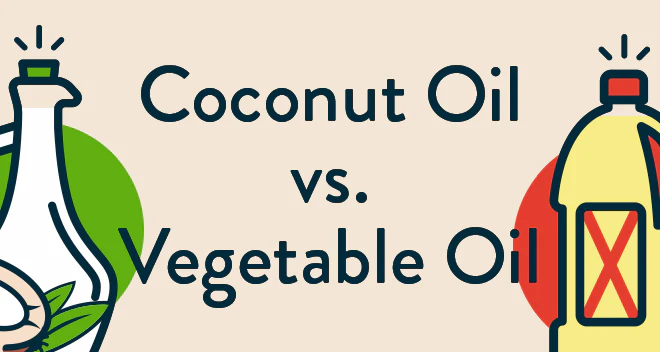Is Coconut Oil Vegetable Oil? The answer to this question depends on how you define “vegetable oil.”
Technical Definition:
Technically, yes, coconut oil is a type of vegetable oil. The term “vegetable oil” broadly refers to any oil derived from plants, and coconuts are technically fruits. So, based on this definition, coconut oil falls under the category of vegetable oil.
Popular Vegetable Oils
| Oil Type | Source Plant | Common Uses | Smoke Point (Refined) | Notes |
|---|---|---|---|---|
| Canola Oil | Rapeseed | Frying, baking, salad dressings | 400°F (204°C) | Neutral flavor, high in monounsaturated fats |
| Soybean Oil | Soybeans | Frying, baking, margarine | 450°F (232°C) | Most widely produced vegetable oil |
| Sunflower Oil | Sunflower seeds | Frying, sautéing, salad dressings | 440°F (227°C) | High in vitamin E |
| Corn Oil | Corn | Frying, baking, margarine | 450°F (232°C) | Mild flavor |
| Peanut Oil | Peanuts | Frying, stir-frying, deep-frying | 450°F (232°C) | Distinct nutty flavor |
| Olive Oil | Olives | Salad dressings, dipping, sautéing (extra virgin) | 375°F (190°C) | Various grades, rich in antioxidants |
| Avocado Oil | Avocados | Salad dressings, sautéing, high-heat cooking | 520°F (271°C) | Mild flavor, good for heart health |
| Grapeseed Oil | Grape seeds | Salad dressings, sautéing, high-heat cooking | 420°F (216°C) | Neutral flavor |
| Sesame Oil | Sesame seeds | Flavoring (toasted), stir-frying | 410°F (210°C) | Strong, nutty flavor |
| Vegetable Oil Blends | Various (soybean, etc.) | Versatile for all cooking needs | Varies | Often labeled as “vegetable oil” |
Common Usage:

However, in everyday language and culinary usage, “vegetable oil” typically refers to refined oils made from seeds like soybean, canola, corn, or sunflower. These oils are often bland in flavor and have high smoke points, making them suitable for high-heat cooking.
Coconut oil, on the other hand, is derived from the meat of mature coconuts and has a distinct coconut flavor and aroma. It is solid at room temperature and melts when heated.
Nutritional Differences:
Coconut oil and commonly used vegetable oils differ significantly in their nutritional profiles:
- Fat Composition: Coconut oil is primarily composed of saturated fat, while most vegetable oils are rich in polyunsaturated fats.
- Health Effects: The health effects of coconut oil are still debated. Some studies suggest it may have benefits like boosting metabolism and improving cholesterol levels, while others raise concerns about its high saturated fat content.
- Usage: Coconut oil is suitable for medium-heat cooking and baking, while refined vegetable oils can withstand higher temperatures.
Conclusion:
So, while coconut oil technically qualifies as a vegetable oil, it’s important to distinguish it from the commonly used refined vegetable oils due to its unique flavor, properties, and nutritional profile. Whether coconut oil is a suitable substitute for vegetable oil in a recipe depends on the specific dish and your personal preferences.
Originally posted 2024-06-17 16:10:02.

